Cartoon: Masks led to another pandemic in Philadelphia
Those disposable, easy to use masks are covering city sidewalks, clogging up our sewer systems, and wreaking havoc with our natural world.

As more people get vaccinated and we begin to put COVID-19 in the rear-view mirror (in the U.S., at least), there’s another pandemic cropping up that’s hard to miss in Philadelphia: discarded masks.
They’re everywhere. Those disposable, easy to use masks that come cheaply in packs of 50 are covering city sidewalks, clogging up our sewer systems, and wreaking havoc with our natural world.
Even if you’re not vaccinated, the odds of catching coronavirus from a discarded mask is extremely low. But beyond being an eyesore and a headache to those responsible for keeping our streets clean, the litter poses a definite risk to the environment.
In New Jersey, volunteers collected more than 1,000 masks and other protective gear from the state’s beaches last year, according to its Clean Ocean Action environmental group. That number is likely a vast undercount of the true number of discarded masks that ended up as marine debris — Ocean Asia estimated that 1.5 billion masks ended up in the world’s oceans last year.
Those masks are made from plastic microfibers, which can’t be recycled and aren’t easily biodegradable (it could take over 450 years for a mask to fully decompose, according to some estimates). However, they do fragment into smaller plastic particles, which pose a threat to our drinking water and any wildlife that tries to eat them. And of course it adds to the already collecting cesspool of plastic waste building up in our oceans.
“Like other plastic debris, disposable masks may also accumulate and release harmful chemical and biological substances, such as bisphenol A, heavy metals, as well as pathogenic micro-organisms,” according to environmental toxicologist Elvis Genbo Xu of the University of Southern Denmark. “These may pose indirect adverse impacts on plants, animals and humans.”
So what can we do? Perhaps the Philadelphia Health Department should consider distributing mask-only trash cans across the city for collection or disposal. Or maybe we can set up places for people to discard masks akin to how we handle plastic bags.
The easiest thing is to simply stop wearing disposable masks and replace them with reusable ones, especially as infections rates drop and more people get vaccinated.
Just discard them in the trash and not on the street. The oceans thank you.
More cartoons
Here are some of my recent cartoons. For more editorial cartoons, visit the Inquirer’s cartoon section.